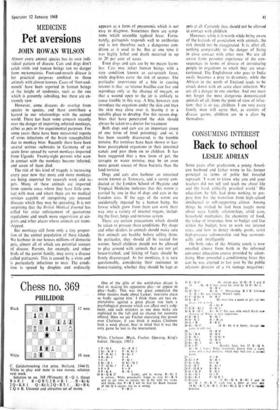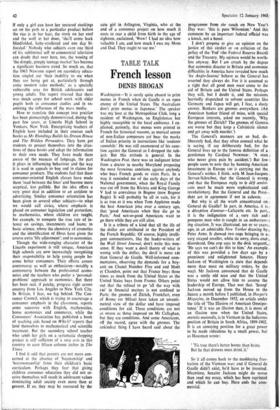Back to school
CONSUMING INTEREST LESLIE ADRIAN
Some years after graduation, a young Ameri- can husband and father wrote to his former principal in terms of polite but forceful reproach. '1 want to know why you and your teachers did not tell and teach me about life and the hard, critically practical world.' His education, he felt, had done nothing to pre- pare him for the transition from high-school intellectual to self-supporting citizen. Among things he wished he had been taught more about were family relationships, child care, household mechanics, the chemistry of food, the value of insurance, how to budget and live within the budget, how to work out interest rates, and how to detect shoddy goods, resist high-pressure salesmanship and buy economi- cally and intelligently
On both sides of the Atlantic youth is now enrolled almost from birth in the informal consumer education course provided by adver- tising. How powerful a conditioning force this can be was attested to last year by the public relations director of a us teenage magazine:
If only a girl can have her textured stockings set on the path to a particular product before the rice is in her hair, the stork on her roof and the wolf at her door, 'she'll come back blindfolded, baby-strollered and one day bi- focaled.' Nobody who subjects even one third of his subliminal self to commercial television can doubt that over here, too, the wooing of 'the dimply, pimply teenage market' has become a significant business trend. So much so, that the- 1963 Newsom report on secondary educa- tion singled out 'their inability to see when they are being got at, particularly through some modern sales methods,' as a specially vulnerable area for British adolescents and young adults. The report stressed that there was much scope for school work with older pupils both in consumer studies and in ex- amining the -influences of the mass media.
How to translate this concept into practice has been pioneeringly demonstrated, during the past few years, at Lincoln High Schonl in Yonkers, New York. Enterprising teachers of English have included in their courses such books as Mr Blandings Builds his Dream House and The Hidden Persuaders. They have got students to project themselves into the situa- tions of these books and adapt the information to their own needs. They have made them aware of the nuances of language, the part it plays in influencing behaviour and the way it is used in appeals -to buy and in claims for consumer products. The students feel that these consumer-oriented English classes have made them 'read between the lines' and become more sceptical, less gullible. But the idea offers a very great deal in addition to an antidote to advertising. Similar consumer orientation has been given to several other subjects—to what we would call civics, where emphasis is placed on consumer legislation and protection; to mathematics, where children are taught, for example, to compute the true rate of in- terest on savings, investments and loans; to basic science, where the chemistry of cosmetics and the identification of fibres have given the course extra 'life adjustment'; and to economics.
Though the wide-ranging character of the Lincoln experiment is still unique, American high schools are now increasingly recognising their responsibility to help young people be- come better consumers. Their efforts arouse controversy as well as enthusiasm—notably a controversy between the professional econo- mists and the teachers who prefer a 'personal- problems' approach to economics. But there has been real, if patchy, progress right across country from Los Angeles to New York City. In Britain, I fear, we lag behind. The Con- sumer Council, which is trying to encourage a consumer emphasis in the classroom, reports some successes with English, mathematics, home economics and commerce, while the Consumers' Association has published a book of teaching aids based on Which? reports that lend themselves to mathematical and scientific treatment. But the secondary school teacher who sends her girls on a systematic shopping project is still sufficient of a rara avis in this country to earn fifteen column inches in The Times.
I find it odd that parents are not more con- cerned at the absence of 'buymanship' and 'borrowmanship' from their children's basic curriculum. Perhaps they fear that giving children consumer education they did not re- ceive themselves will result in adolescent values dominating adult society even More than at present. If so, they may be reassured by the cute girl in Arlington, Virginia, who at the end of a consumer project on how much it costs to rear a child from birth to the age of eighteen, exclaimed, 'Wow! I had no idea how valuable I am, and how much I owe my Mom and Dad. They ought to sue me.'































 Previous page
Previous page